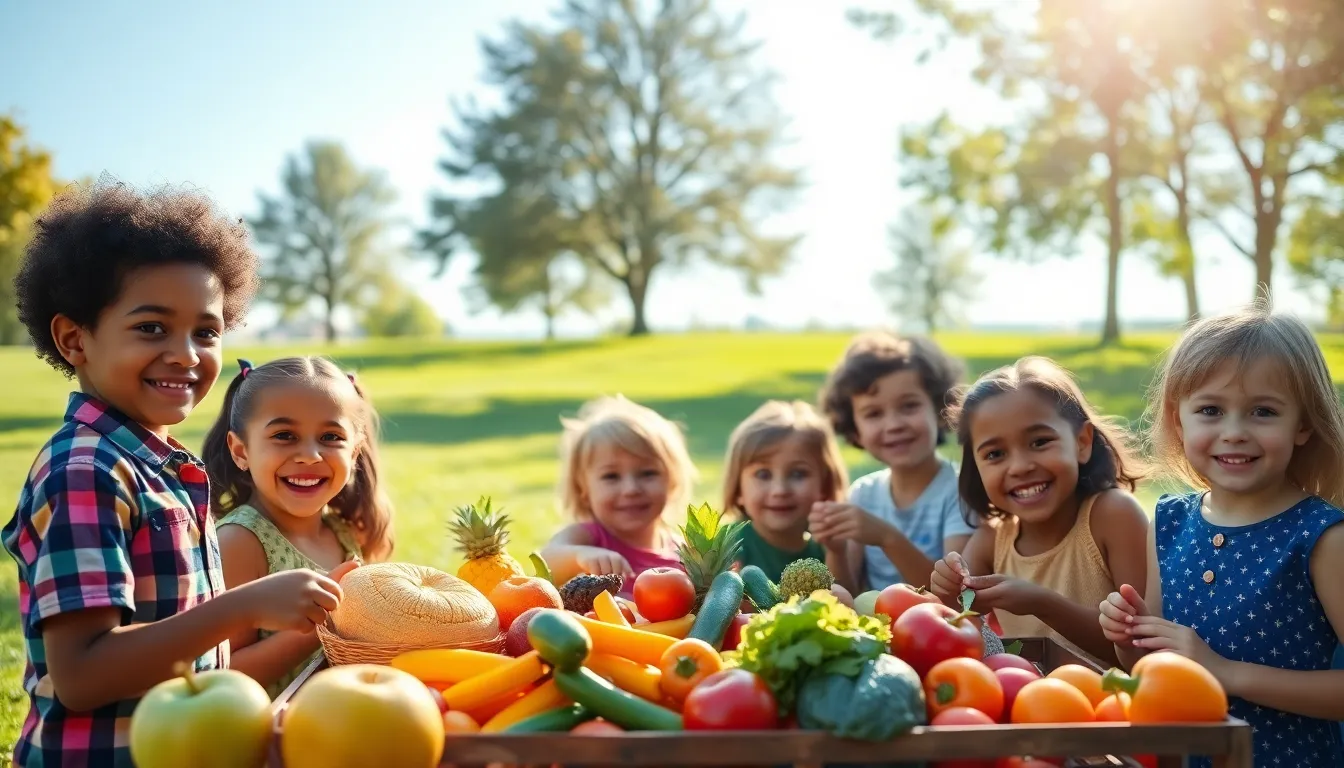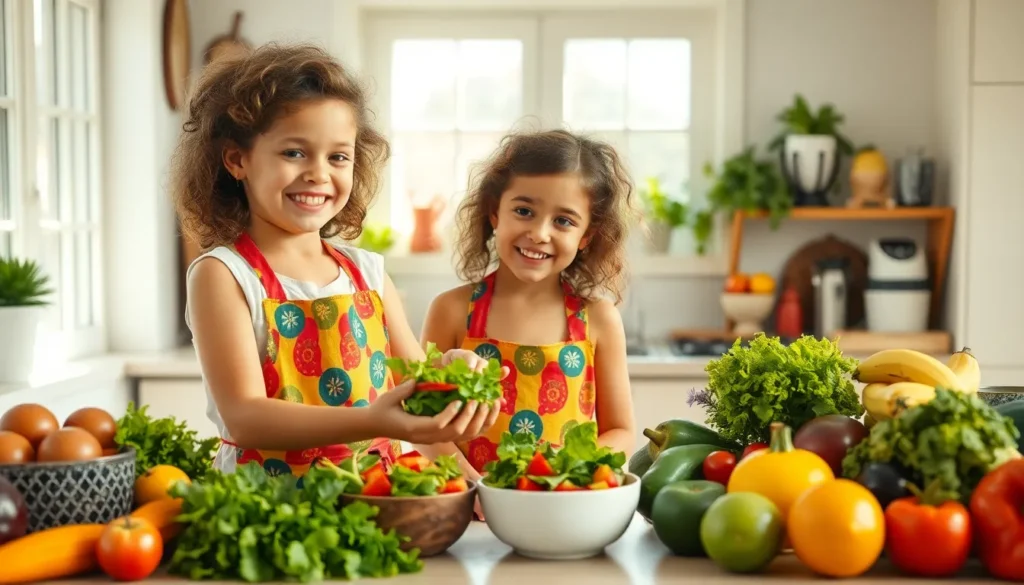Table of Contents
ToggleIn a world where kale reigns supreme and tofu is the new chicken nugget, raising vegan kids is becoming the trendiest parenting choice. Picture this: your little ones munching on vibrant fruits and veggies while their friends are stuck with boring old burgers. Not only are they saving the planet one carrot at a time, but they’re also becoming the coolest kids on the block.
Understanding Vegan Kids
Raising vegan kids presents unique opportunities and challenges. Parents often focus on ensuring their children receive balanced nutrition in this lifestyle.
Nutritional Needs
Nutritional requirements for vegan kids include a variety of essential nutrients. Protein sources such as lentils, chickpeas, and quinoa support growth. Calcium-rich foods like fortified plant milks and leafy greens promote strong bones. Omega-3 fatty acids, found in flaxseeds and walnuts, support brain development. Iron, sourced from beans and fortified cereals, helps prevent anemia. Vitamin B12, often missing in plant-based diets, necessitates supplementation or consumption of fortified foods. A balanced approach guarantees that vegan children thrive, fulfilling all dietary needs throughout their growth phases.
Common Misconceptions
Many misconceptions surround vegan kids and their diet. One common myth suggests that vegan diets lack protein. However, diverse plant foods provide ample protein when consumed in appropriate quantities. Some believe children require dairy for calcium intake, while numerous dairy alternatives offer sufficient amounts. Another misconception is that vegan diets are too restrictive. In reality, the variety of plant-based foods allows for creativity and exploration in meals. Concerns about nutrient deficiencies also arise, yet with proper planning, vegan diets can be nutritionally complete. By understanding these myths, parents can make informed decisions about raising healthy vegan kids.
Benefits of a Vegan Diet for Kids

A vegan diet offers multiple advantages for children. This approach emphasizes nutrient-dense foods, which enhance overall health.
Health Advantages
Vegan diets often result in increased intake of fruits and vegetables. Higher consumption of these plant foods leads to essential vitamins and minerals. These nutrients support immune function and encourage healthy growth. Research indicates that vegan children may maintain lower cholesterol and blood pressure levels. Additionally, the risk of obesity tends to decrease among those following plant-based diets. It’s essential for parents to ensure balanced nutrition by incorporating protein sources like lentils and chickpeas. Calcium from fortified plant milks and leafy greens is also crucial. Overall, a well-planned vegan diet can promote lasting health benefits in kids.
Environmental Impact
Choosing a vegan diet significantly contributes to environmental sustainability. Plant-based eating reduces greenhouse gas emissions compared to meat-heavy diets. Research highlights that livestock farming contributes substantially to deforestation and water pollution. By consuming more plant foods, children support biodiversity and minimize their ecological footprint. Parents can instill eco-friendly habits at a young age by teaching kids about sustainable food choices. Supporting local, organic farms enhances this impact even further. A vegan lifestyle fosters awareness of environmental issues, promoting future generations’ commitment to sustainable living.
Potential Challenges
Raising vegan kids presents unique challenges. Parents may encounter specific difficulties related to dietary restrictions and social situations.
Dietary Restrictions
Dietary restrictions can pose complications for vegan children. Many common foods contain animal products, making it essential to find suitable alternatives. Parents must ensure their kids receive balanced nutrition, focusing on protein sources like lentils and chickpeas. Calcium from fortified plant milks and leafy greens plays a critical role in bone health. Attention to omega-3 fatty acids from flaxseeds and walnuts is vital for brain development. Iron should come from beans and fortified cereals to support energy levels. Awareness of vitamin B12 supplementation safeguards against deficiencies, providing peace of mind for parents who prioritize their child’s health.
Social Situations
Social situations often create challenges for vegan children. Birthday parties or school events may feature non-vegan foods that kids might find difficult to resist. Parents can promote confidence by encouraging open conversations about their dietary choices with peers. Creating inclusive events with vegan-friendly snacks helps foster acceptance among friends. When dining out, selecting restaurants with plant-based options becomes important, ensuring kids feel comfortable eating away from home. Teaching children to advocate for their dietary needs helps them navigate social challenges while building resilience and self-esteem.
Tips for Transitioning to a Vegan Lifestyle
Embracing a vegan lifestyle for kids requires careful planning and creativity. Focusing on balanced meals that incorporate a variety of plant-based foods is essential.
Meal Planning
Meal planning simplifies the transition to veganism. Prepare a weekly menu featuring fruits, vegetables, whole grains, and legumes. Include snacks like nuts, seeds, or hummus with veggies. Aim for diversity in meals to ensure children receive vital nutrients such as protein, calcium, and iron. Combining foods, such as pairing lentils with brown rice, enhances nutrient absorption. Create a shopping list based on planned meals to avoid impulse purchases of non-vegan items. Adjust the plan as needed while keeping it flexible to adapt to children’s preferences.
Involving Kids in Cooking
Involving kids in cooking fosters excitement about vegan meals. Start with simple tasks like washing vegetables or mixing ingredients. Allow children to choose recipes that appeal to them. Let them explore different flavors and textures, which increases their interest in plant-based foods. Offering cooking classes or online tutorials can enhance their skills. Encourage creativity by suggesting they customize their meals with various toppings or seasonings. Engaging kids in the cooking process also provides an opportunity to discuss healthy eating habits.
Raising vegan kids offers a unique opportunity to instill healthy habits and environmental consciousness from a young age. By providing balanced nutrition and engaging children in the cooking process, parents can foster a love for plant-based foods. Navigating social situations and dietary challenges becomes easier with open conversations and creative solutions.
As children learn to advocate for their dietary choices, they build resilience and confidence. The benefits of a vegan lifestyle extend beyond personal health, promoting sustainability and a better future for the planet. Embracing this lifestyle can empower the next generation to make informed and compassionate choices, shaping a healthier world for everyone.





